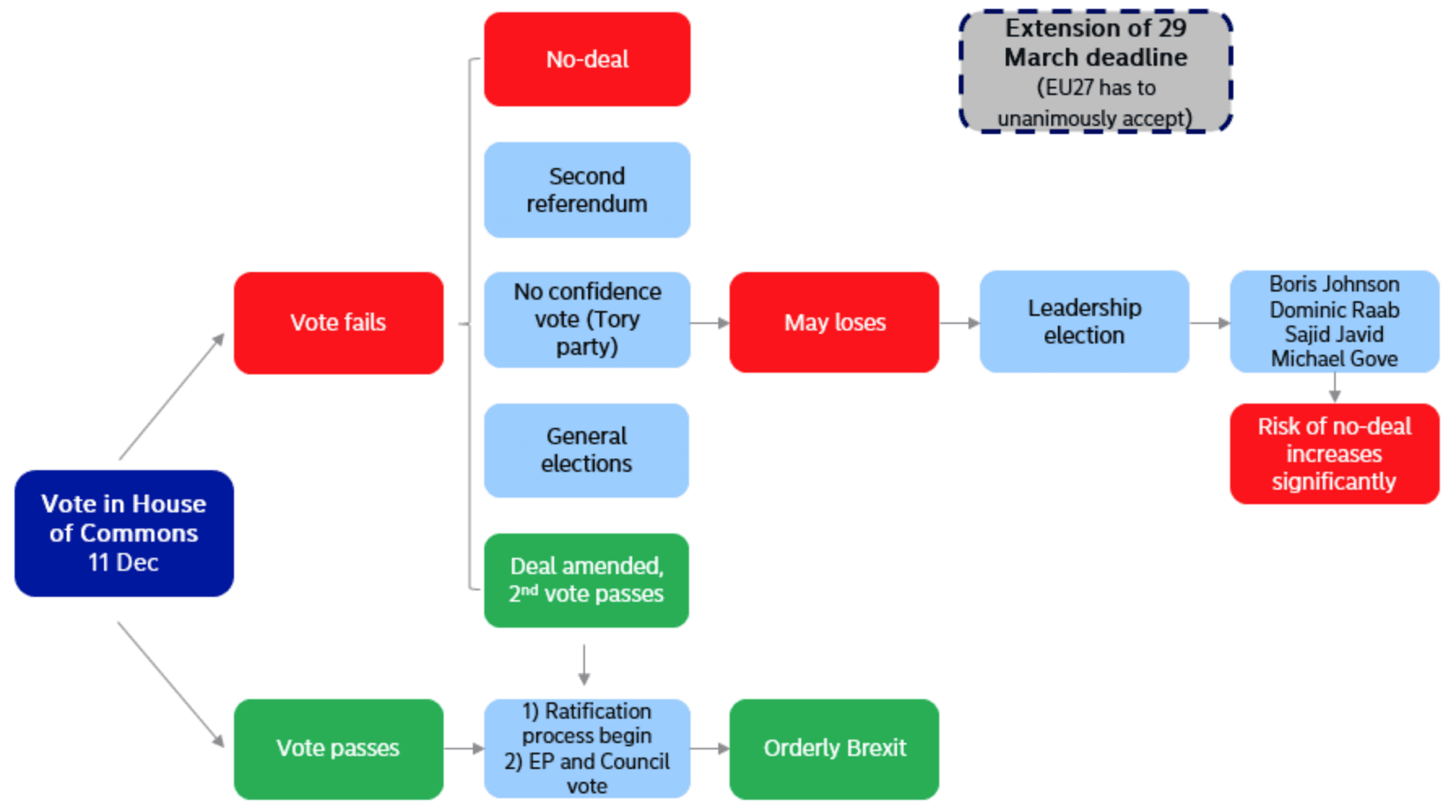Chronic Uncertainty to Weigh on Pound Sterling in 2019 as Brexit is Delayed: Handelsbanken

Image © Goroden Kkoff, Adobe Stock
- Brexitdeal unlikely to win MPs approval
- EU will allow an extension of Article 50 to accommodate
- Forecasts show Pound Sterling to fall further amidst chronic uncertainty
A delay to the UK’s withdrawal from the EU is now likely given the fierce opposition to the government’s Brexit deal in parliament says a new analysis from Handelsbanken, and this will keep Sterling under pressure during 2019.
Analysts at the Scandanavian bank say Brexit will likely be delayed beyond the March 2019 exit to allow for the running of new elections, or a second referendum, as a divided parliament will be unable to unite behind any one position.
"In our eyes, the most likely scenario is that the exit date will be moved to the end of 2019, meaning that the uncertainty surrounding Brexit will not subside," says Kari Due-Andresen, analyst at Handelsbanken.
The call comes as parliament sets out debating the UK-EU deal reached in November, ahead of a December 11 vote which the government is widely expected to lose.
The British Pound has come under pressure over the past two weeks when it became clear the deal struck between the EU and UK could not command the support of parliament to pass into law.
The Pound-to-Euro exchange rate has fallen from multi-month highs near 1.1550 and appears to be forming a base just above 1.12 while the Pound-to-Dollar exchange rate has fallen from levels above 1.31 to the 1.27s we are witnessing at the current time.
The Maths, why the Deal Won't Pass First Time
320 is the de facto threshold needed for the Government to pass the bill,
Estimates from Nordea Markets suggest around 145 MPs on the government's payroll (27 cabinet ministers/attendants, 65 on government payroll, 50 ministerial assistants and three whips) as well as roughly 75 Conservative loyalists will vote in favour of the deal.
In addition, one Liberal Democrat has confirmed he will support May’s deal.
That totals 221, the government therefore faces a shortfall of at least 99 votes to allow the UK to leave the European Union in March 2019 with a deal in place.
"The deal will not pass, if MPs vote as they say they will. This also seems to slightly be the consensus in the financial markets when looking at indicators such as GBP risk reversals, surveys and speculative sterling positioning," says Morten Lund with Nordea Markets.
Some reports put the scale of the potential loss faced by the government near 200.
Such a result will probably lead to her resignation, another general election or another referendum.
Image courtesy of Nordea Markets.
Delayed Brexit Likely
There will be insufficient time for any public vote to take place before the March 29 Brexit deadline so it is likely the EU will allow an extension of the deadline until the end of the year.
According to the Constitution Unit of UCL, the minimum period that would be needed to pass legislation, have a campaign, and hold a referendum would be 22 weeks. That already requires an extension of the Article 50 negotiating period, which in turn requires the unanimous approval of the European Council.
Thus the current limbo for both UK politics and the British Pound looks very likely extend.
"We believe that the EU would be likely to permit an extension of Article 50 and the postponement of the exit date in order to safeguard the democratic process. This means in practice that the UK’s exit from the EU would be postponed, probably until the end of 2019, with high uncertainty surrounding the process continuing as a result. We deem this scenario to be the most probable," says Due-Andresen.
In its base case scenario Handlesbanken sees the Pound weakening initially after the deal is rejected by Parliament but its trajectory beyond then dependent on which course is taken.
A second referendum might cause a recovery, for example, given recent polls suggest a shift to remaining, whilst a second election would be less easy to predict and therefore impact Sterling one way or another less clearly.
'No Deal' Brexit Also Unlikely
One potential outcome is the deal currently on the table gets a vote of approval in Parliament on December 11, leading to a sharp rally in the Pound.
Another, is that the deal gets voted down but Theresa May’s replacement leader presents and gets support for a different deal, perhaps, more along the lines of a Norway agreement. This too is highly unlikely as the EU appears extremely averse to altering the deal already proposed.
Furthermore, the likelihood of May standing down is an assumption we don't share; we believe she will attempt to win a second vote with some amendments to the bill. But we agree with Handelsbanken's assessment that no major concessions from the EU are likely.
“There seems to be scant chance of success in negotiating minor changes to the agreement, given that the EU has publicly stated that the deal on the table is the best the UK can hope for. In addition, the UK parliament has already voted against the proposal, with major amendments likely to be necessary before parliament provides its backing,” says Due-Andresen.
Advertisement
Bank-beating GBP exchange rates: Get up to 5% more foreign exchange by using a specialist provider to get closer to the real market rate and avoid the gaping spreads charged by your bank when providing currency. Learn more here
The 'no deal' Brexit currently favoured by Conservative party politicians who argue for a 'pure Brexit' cannot be ruled out either.
Under this scenario, WTO trade rules applied.
"We believe this scenario would have disastrous consequences for the economies of both the UK and the EU. Sterling would nosedive in the recession that we expect would probably follow," says Due-Andresen.
A no-deal Brexit would however require the approval of parliament, and as there is nowhere near a majority favouring this scenario, Handelsbanken consider it to be an extremely unlikely outcome.
This outcome should provide some solid downside protection to the currency.
Forecasts for the Pound
Handelsbanken are forecasting the Pound-to-Dollar exchange rate to trade at 1.25 by year-end and 1.23 by the end of the first quarter of 2019.
At the time of writing the GBP/USD exchange rate is quoted at 1.2778 on the interbank market with high-street banks offering exchange rates in the 1.2430-1.2520 bracket for international payments and transfers. Specialist currency providers are offering rates in the 1.2660-1.2690 bracket.
The Pound-to-Euro exchange rate is forecast to trade at 1.11 by the end of 2018 and 1.10 by the end of the first quarter.
At the time of writing the GBP/EUR exchange rate is quoted at 1.1246 on the interbank market.
High-street banks are offering rates in the 1.0950-1.1030 region for international payments we believe, while independent providers are seen to be providing in the 1.1150-1.1170 region.

